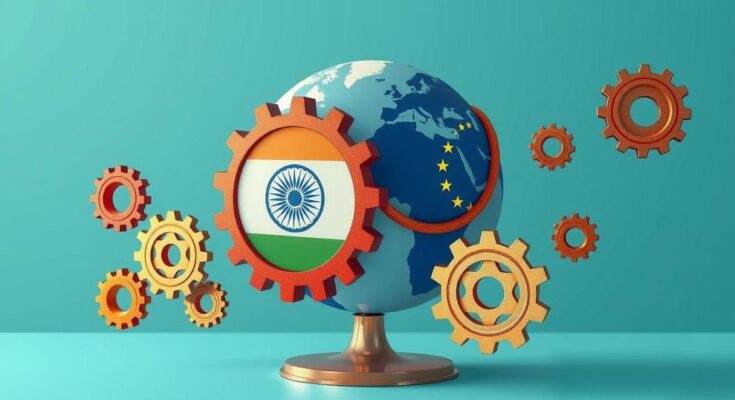Ursula von der Leyen, President of the European Commission, called for a reimagined partnership between India and the EU, urging the finalization of a free trade agreement this year. She also announced plans for a security and defense partnership to tackle shared threats such as terrorism and maritime security. Emphasizing the urgency of collaboration, von der Leyen addressed the complexities of current geopolitical dynamics.
Ursula von der Leyen, President of the European Commission, emphasized the need for India and the European Union (EU) to reimagine their partnership amid ongoing geopolitical challenges. Speaking during her visit to India with 20 members of the EU’s College of Commissioners, she highlighted the urgency to finalize a free trade agreement (FTA) within the year. Moreover, she announced plans for a security and defense partnership between the EU and India to address shared threats such as cross-border terrorism and maritime security.
During her remarks, von der Leyen framed this moment as a pivotal opportunity for both parties to enhance their collaboration. She noted, “This world is fraught with danger. But I believe this modern version of great power competition is an opportunity for Europe and India to reimagine their partnership.” She urged both sides to elevate their strategic partnership in light of emerging global challenges.
Describing 2025 as a crucial turning point, she acknowledged the various adversities the EU and India face due to rising geopolitical tensions and economic coercion. Emphasizing the importance of mutual security and prosperity, von der Leyen stated, “It is time to take our EU-India strategic partnership to the next level. For our own security and our prosperity. For the common global challenges that we face.”
The FTA negotiations, which initially began in 2007 but were paused in 2013, have resumed as of 2022, with significant issues remaining regarding market access and tariffs. The tenth round of negotiations is scheduled for March 10-14 in Brussels, highlighting both sides’ commitment to finalizing this major trade objective. Von der Leyen expressed her determination to ensure that the agreement is concluded within the year.
In addition to trade, von der Leyen introduced the concept of a strategic defense partnership with India, similar to agreements with Japan and South Korea, aimed at countering shared security threats. She mentioned ongoing collaborations that can be built upon to address issues like terrorism, cyber-attacks, and threats to critical infrastructure.
Von der Leyen also subtly touched upon global economic disruptions fueled by the U.S. and challenges posed by China’s assertiveness, stressing the importance of forming resilient supply chains. She noted that both India and the EU aspire to diversify their critical value chains, thereby enhancing their economic security.
Furthermore, she discussed the potential for cooperation in various high-tech sectors, suggesting that joint investments could yield significant advantages in a competitive global economy. Emphasizing the interconnectedness of global stability, she referenced the Ukraine crisis, remarking that the outcome there holds implications for peace beyond Europe.
In her concluding remarks, von der Leyen sought to underscore the gravity of geopolitical tensions, emphasizing that nations worldwide are observing how the international community responds to threats to sovereignty and territorial integrity.
In summary, Ursula von der Leyen’s visit to India highlights the imperative for the EU and India to strengthen their partnership through a free trade agreement and enhanced security collaborations amidst increasing geopolitical challenges. With shared interests in economic cooperation and stability, both parties are encouraged to pursue strategic initiatives that would bolster their defenses and address mutual threats.
Original Source: www.hindustantimes.com




